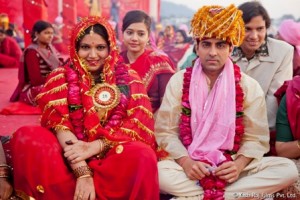“Dum Laga Ke Haisha” is rooted in reality

MUMBAI (Reuters) - Sharat Katariya’s “Dum Laga Ke Haisha” (which roughly translates to “give it all you’ve got”) is one of those films that you have to pay close attention to if you want to enjoy it to the full. There is so much to like here – the attention to detail, the quirky characters; and you are likely to miss it if your attention wavers to your phone or your popcorn.
Katariya’s tale is one of old-world romance, punctuated by over-the-top 90s songs, stolen looks and passive-aggressive fights. It is also a tale of the dysfunctionality that is present in every family, often obscured by the cheery tone and the general good-natured ribbing that goes on when extended relatives gather.
This is 1995, when liberalisation had just taken off in the country and the benefits hadn’t percolated down to the town of Haridwar. Prem Shankar Tiwari (Ayushmann Khurrana), who runs a dusty, dilapidated music shop, is passionate about cassettes and the songs that he plays on them. But CDs are coming into the market and no one wants to buy tapes any more. Business isn’t good, so his family decides to make a transaction that will save them from penury. They fix a match for him with an educated girl who has good job prospects and can help prop up the family’s finances.
The problem is that Sandhya (Bhumi Pednekar) is on the heavier side at 85 kg and not the girl of Prem’s dreams. He despises her and her size, and is blind to her feisty nature and consistently positive outlook in life, something that the perpetually whiny Prem desperately needs. Sandhya though, seems to be in love with Prem, despite his rather prickly behaviour, and is willing to take the initiative in the relationship. She isn’t afraid to slap her husband when he hurts her, but she will also gladly get up and give him a glass of water in the middle of the night.
As delightful as the chemistry between Khurrana and Pednekar is, what is even more delightful are the repartee between the other characters. When a lawyer extols the virtues of divorce and how empowering it is for women, Sandhya’s perplexed mother turns to her son and asks: “If she’s talking about breaking them up, why is she smiling?”
“Dum Laga Ke Haisha” is full of moments like these, and is a wonderful statement on the institution of marriage as seen by many Indians. Marriage is a transaction, often carried out for the most practical of reasons, but once sealed, it seems sacrilegious to break it, even if the reasons for coming together don’t make sense.
The casting in this film (by Shanoo Sharma) is perfect. Right from Sheeba Chaddha as Prem’s crabby aunt to Sanjay Mishra as the father, they are all perfect for their roles. The cinematography, by Manu Anand, is as evocative as some of the dialogue, and Katariya himself steers his vehicle with a deft hand.
This might not be your everyday Bollywood romance, but it is one that should be celebrated, because it is a love story that is rooted in reality.







